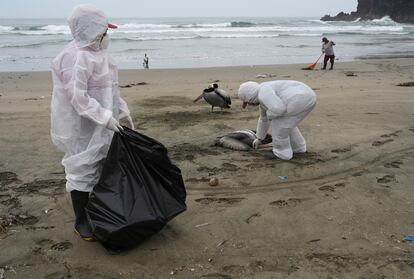Bird flu: Scientists find mutations, but say threat is still low
It appears the mutations are only in one hospitalized patient in Chile, and may have developed in him after he got sick

A man in Chile is infected with a bird flu that has concerning mutations, but the threat to people from the virus remains low, U.S. health officials said Friday. Past animal studies suggest these mutations could cause the virus to be more harmful or spread more easily, health officials said. But they also said there is no evidence that the mutations would make it easier for it to take root in a person’s upper lungs — a development that would raise concerns about spread among people.
The mutations do not change public health officials’ assessment of the overall risk to people from the H5N1 virus, which “continues to be low,” said Vivien Dugan of the Centers for Disease Control and Prevention.
The mutations, which have appeared only in the one hospitalized patient, may have occurred after the man got sick, CDC officials said. There’s no evidence that the mutated virus spread to other people, mixed with other flu viruses, or developed the ability to fight off current medicines or evade vaccines, agency officials said.
Such genetic changes have been seen in past bird flu infections.
“Nevertheless, it’s important to continue to look carefully at every instance of human infection,” Dugan said. “We need to remain vigilant for changes that would make these viruses more dangerous to people.”
This type of flu, called Type A H5N1, was first identified as a threat to people during a 1997 outbreak in Hong Kong, when visitors to live poultry markets caught it.
Sporadic outbreaks have followed, and more than 450 people have died in the past two decades from bird flu infections, according to the World Health Organization. The vast majority of infected people got it directly from birds.
As bird flu hits other species, however, scientists fear the virus could evolve to spread more easily among people. And it has been spreading widely, to birds and animals in scores of countries.
In the U.S., it has recently been detected in wild birds in every state, as well as in commercial poultry operations and backyard flocks across the country. Since the beginning of last year, tens of millions of chickens have died of the virus or been killed to stop outbreaks from spreading, one of the reasons cited for soaring U.S. egg prices.
The new lab analysis looked at the virus found in the lungs of a 53-year-old man living in Chile’s Antofagasta region. It may be that he became infected through contact with sick or dead birds or infected sea lions, according to a WHO summary of the case.
The man was healthy and had not traveled recently. On March 13, he started getting a cough, sore throat and hoarseness, the WHO said.
His symptoms worsened and he eventually was sent to an intensive care unit and treated with antiviral medicines and antibiotics. He is still hospitalized and being monitored, CDC officials said.
Genetic sequencing this week revealed the two concerning mutations. Chilean and American health officials have been working together on the investigation.
Andrew Pekosz, a flu researcher at Johns Hopkins University, said he hasn’t seen the preliminary analysis of the Chilean patient’s infection.
“When these viruses get into humans, there’s a likelihood that they start to adapt to grow better in us,” and this is a sign that is happening, he said.
There are three or four kinds of mutations that would need to be seen in a H5N1 virus “before that would really raise the alarm signal that something is happening of concern,” he added.
Sign up for our weekly newsletter to get more English-language news coverage from EL PAÍS USA Edition
Tu suscripción se está usando en otro dispositivo
¿Quieres añadir otro usuario a tu suscripción?
Si continúas leyendo en este dispositivo, no se podrá leer en el otro.
FlechaTu suscripción se está usando en otro dispositivo y solo puedes acceder a EL PAÍS desde un dispositivo a la vez.
Si quieres compartir tu cuenta, cambia tu suscripción a la modalidad Premium, así podrás añadir otro usuario. Cada uno accederá con su propia cuenta de email, lo que os permitirá personalizar vuestra experiencia en EL PAÍS.
¿Tienes una suscripción de empresa? Accede aquí para contratar más cuentas.
En el caso de no saber quién está usando tu cuenta, te recomendamos cambiar tu contraseña aquí.
Si decides continuar compartiendo tu cuenta, este mensaje se mostrará en tu dispositivo y en el de la otra persona que está usando tu cuenta de forma indefinida, afectando a tu experiencia de lectura. Puedes consultar aquí los términos y condiciones de la suscripción digital.








































